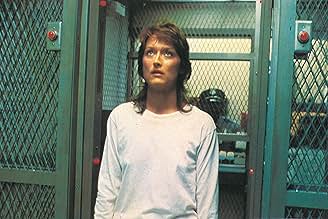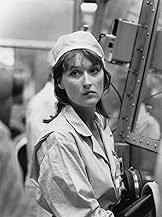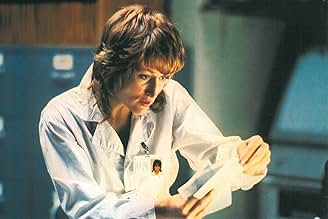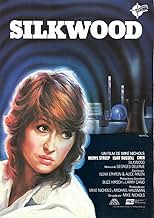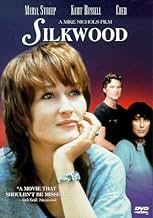Karen, en galère sentimentale et matérielle, est employée d'une centrale nucléaire qui fuit de partout. Malgré les intimidations de sa hiérarchie, et à l'étonnement de ses proches, Karen déc... Tout lireKaren, en galère sentimentale et matérielle, est employée d'une centrale nucléaire qui fuit de partout. Malgré les intimidations de sa hiérarchie, et à l'étonnement de ses proches, Karen décide d'implanter le syndicat. Elle aura finalement un accident (?) [en 255 car. pour champ ... Tout lireKaren, en galère sentimentale et matérielle, est employée d'une centrale nucléaire qui fuit de partout. Malgré les intimidations de sa hiérarchie, et à l'étonnement de ses proches, Karen décide d'implanter le syndicat. Elle aura finalement un accident (?) [en 255 car. pour champ texte]
- Nommé pour 5 oscars
- 2 victoires et 19 nominations au total
Avis en vedette
How do you judge people ?
When should you let go ? And when should you stick around ?
With "amazing grace", the beautiful Meryl Streep and Karen Silkwood have both tried to answer our questions. This wonderful movie wasn't about Silkwood's bravery in demanding people's absolutely basic rights only.
Most of people judge others by their own definition of "honour". You tell a friend about how this woman sleeps with everyone and the word goes on about how this promiscuous woman is a devil. This portrayal of Karen Silkwood will definitely conquer your image and your ways of judgment. As you can see her life ends, you'll know what really matters in life and what real honour looks like. You'll know that each one of us has their own demons, and some more than others, maybe for the bigger part, because they've witnessed what the rest didn't in their lives. You can never judge this woman saying she left her children when she's fighting for the framed pictures they're taking from her as they've found her house's contaminated, you can never judge her emotional and sexual behaviour when you see the look - to Drew- in her eyes before she dies and you can never judge the quality of her life given her psychological disturbance. This beautiful woman fought for what really matters in this life: end of fear .. end of blackmail for money and food. She's a hero by all means, defying all sorts of authorities with absolutely no support most of the time. You can see the struggles of being with someone who wouldn't save the world like you're trying to, but turns out to love you as you are with all your demons.
The real lesson for most people in this movie was about bravery and courage, but for me, it was mostly about acceptance, judgment and what really matters in this life.I can't thank Meryl Streep, Cher, Kurt Russel and Director Mike Nichols enough for this masterpiece, especially the ever-amazing and graceful, Mrs Streep .. You've taught me more than I've ever learnt from anybody in my own life.
For instance, in the scene where the characters are looking at the slides of the trip to Washington: towards the end are two photos with Streep and Ron Silver's character. In the second photo, she leans into him a little bit. That tiny bit of body language makes us wonder - and Kurt Russell's character too. He suddenly moves his arm from around Streep's and suddenly she's aware that something's wrong. It's all in the unspoken. There isn't a preceding scene where she picks up the other guy, or goes to bed with him or even lies to Kurt Russell. It just cuts to this scene, and we the viewer learn along with Kurt that she's been unfaithful - which also reveals a little more about this person Karen Silkwood.
She's not a perfect hero - she's flighty, irresponsible, impulsive and non-committal - so the question becomes, why did she change? Why did she risk her life when she finally truly understood the risks? And how does Kurt Russell come to terms with this changed person he is in love with, given that he is just a guy who knows how to fix a car not save the world?
Watch Mike Nichols' inspired direction; he rarely cuts away in the middle of a scene. A lot of Kurt, Cher and Meryl's acting happens all in one take. *That's* truly good acting and directing.
Good dialogue in a film is in knowing what's happening without it being said. Don't fast forward the first hour - really pay attention and see how much you learn from the small details that will enrich your viewing of this film.
When I was sixteen years old I broke both legs, and was out of school for two months. But twice a week my father, who worked nights as a security guard at the Kerr-McGee office building, took me downtown to the federal courthouse in Oklahoma City, to watch the proceedings of the Silkwood v. Kerr-McGee trial during morning sessions. He insisted I go, he said, "So you'll learn something." I learned a lot about people then, and about the law, and the experience certainly took my mind off my own physical discomfort.
Mr. Paul, an excellent corporate lawyer, represented Kerr-McGee, which leased the operation of the plutonium plant in Crescent, Oklahoma, about thirty miles north of here. Mr. Spence represented the children of Karen Silkwood. Mr. Paul and his six associates seemed to change their suits every day. Perhaps they didn't want to see like the "great gray wall" -- which was the stereotype of corporate lawyers. But the net effect of seven men striving to seem individual was that of a great plumed serpent preparing to devour any small creature in its path. Mr. Spence, on the other hand, wore the same buckskin fringed coat each day. Each day he would place his Stetson on his table. He and the hat sat in splendid silence while the Kerr-McGee attorneys conferred and whispered.
Both men counted on the sentiments of a working-class jury. Mr. Paul figured people would recognize the contribution made to the community by Kerr-McGee, a locally owned business with world-wide influence, which provided many jobs to people here. Mr. Spence counted on them harboring deep suspicions, after having been treated like throw-away people for so many years by other employers of the same size as Kerr-McGee. My father was such a person. He worked for Kerr-McGee, but he distrusted corporate politics, and rightly figured they'd let him go right before he qualified for a pension. Later, that's exactly what happened.
Mr. Spence has sued the corporation for 2 million dollars. But the jury awarded him, and Karen Silkwood's children, five times that much. Later, thanks to an excellent foundation laid by Mr. Paul, Kerr-McGee was able to get the conviction overturned, then eventually settled for a payment of 1 million dollars to the grown children. Of course, Mr. Spence took about half of that, and after taxes, I suppose each of the three children had about enough to get a college education, or to buy a new truck and have a down payment on a house.
That's what happened to me. My father died not longer after being let go by Kerr-McGee. There was enough insurance money to pay for my college education. Then my mother died. For many years the social atmosphere in the Kerr-McGee offices, where one of my friends worked as a draftsman, prevented anyone from ever saying anything good about Karen Silkwood. I will not repeat was generally said about her, or her social life, her motivations or her politics.
I never met her, but I did see and hear the people who were for Karen Silkwood, and those who were against her, at the trial. It was clear to me that whatever else she may have been, she was a courageous person. By the time the movie was released, I was a junior in college, and suddenly changed my major to drama. After graduation, I found work with a film production company which filmed herds of cattle -- "Video Auction" was its name. Then I went to California, where I taught drama, or worked as a stage manager, for twenty years.
Watching "Silkwood" last week, for the first time in 24 years, reminded me of what the trial, and later the movie, showed me -- the part of you that lasts is what you have done for others. The lawyers will take everything else.
Le saviez-vous
- AnecdotesThe scene where Karen sets off the radiation alarms actually happened. Her level of contamination was forty times the safe limit.
- GaffesAfter Karen's first contamination, she and Drew are at home, and Drew is laid out on the bed playing his banjo, and black (X) marks can be seen on the quilt.
These are not actor position marks, but (repeating) parts of the quilt pattern. Drew's body lining up on the marks is just chance.
- Citations
Karen Silkwood: You think I contaminated myself, you think I did that?
Mace Hurley: I think you'd do just about anything to shut down this plant.
- ConnexionsEdited into The Clock (2010)
- Bandes originalesSilkwood Main Titles
Written and Performed by Georges Delerue Et Son Orchestre
Meilleurs choix
- How long is Silkwood?Propulsé par Alexa
Détails
Box-office
- Budget
- 10 000 000 $ US (estimation)
- Brut – États-Unis et Canada
- 35 615 609 $ US
- Fin de semaine d'ouverture – États-Unis et Canada
- 1 218 322 $ US
- 18 déc. 1983
- Brut – à l'échelle mondiale
- 35 616 970 $ US
- Durée
- 2h 11m(131 min)
- Mixage
- Rapport de forme
- 1.85 : 1


